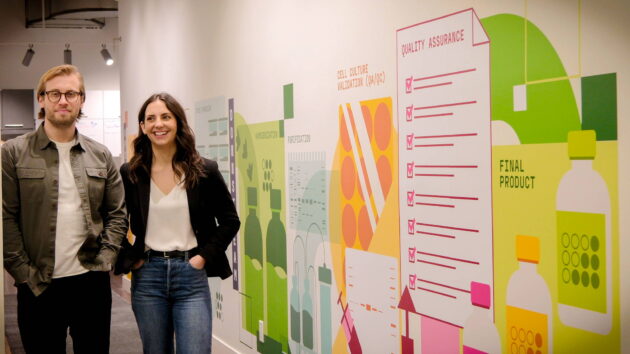
Future Fields lands $11M to turn flies into bioreactors
By Food in Canada staff
Food In Canada Research & Development cultivated meat FoodtechFuture Fields has created EntoEngine, an approach that uses fruit flies instead of giant steel tanks as bioreactors.
 Future Fields' Co-founders, Matt Anderson-Baron (CEO) and Jalene Anderson-Baron (COO). (Photo: Future Fields)
Future Fields' Co-founders, Matt Anderson-Baron (CEO) and Jalene Anderson-Baron (COO). (Photo: Future Fields) The raw material needed for medicine, vaccines and cultivated meat are created in bioreactors. There’s a critical need to shrink the cost, increase the supply and diminish the carbon footprint of bioreactors.
Future Fields has created EntoEngine, an approach that uses fruit flies and not giant steel tanks. The company announced that it received a US$11.2M round from VCs and government contracts, and the launch of its first product outside of serving cultivated meat, targeting industries of research, cell therapies and biopharmaceuticals. The funds will provide initial capital to open a world first production facility and scale the team.
The global operating supply of bioreactors is dwarfed by the demand of industries that need them, and this infrastructure problem is only getting worse. In considering the needs of cultivated edible protein alone, 10 billion L of bioreactor capacity will be needed by 2030 and only 61 million L exist today. In other words, a 163X supply-demand gap needs to be overcome in less than a decade.
The output of bioreactors – recombinant protein – meanwhile accounts for 50-85 per cent of the total cost for companies in cultivated meat.
“We’ve passed a tipping point where it’s scaling, not creating, biotech-based products that is the fundamental hurdle for founders, companies and entire industries,” said Matt Anderson-Baron, co-founder and CEO of Future Fields. “Our approach is 30X faster than tanks and more or less infinitely scalable with minimal investment; this is how we’ve already commercialized our first few products. As we unlock more proteins, we can scale production capacity while continuing to service over 60 companies in cellular agriculture and beyond.”
By using flies, Future Fields can quickly add more supply with minimal investment, and drop the energy needs of its factory all while having control over the quality of its product.
“Biotechnology is bubbling with innovation, but to date, little funding has gone to biomanufacturing production infrastructure at scale. Traditional bioreactors are expensive, wasteful, and capacity-limited,” said Jim Adler, founder and general partner of Toyota Ventures. “It is time for disruptive innovation. We applaud Future Fields’ cost-effective, sustainable, and scalable biomanufacturing platform to fuel biotechnology’s next life-saving inventions.”
Print this page